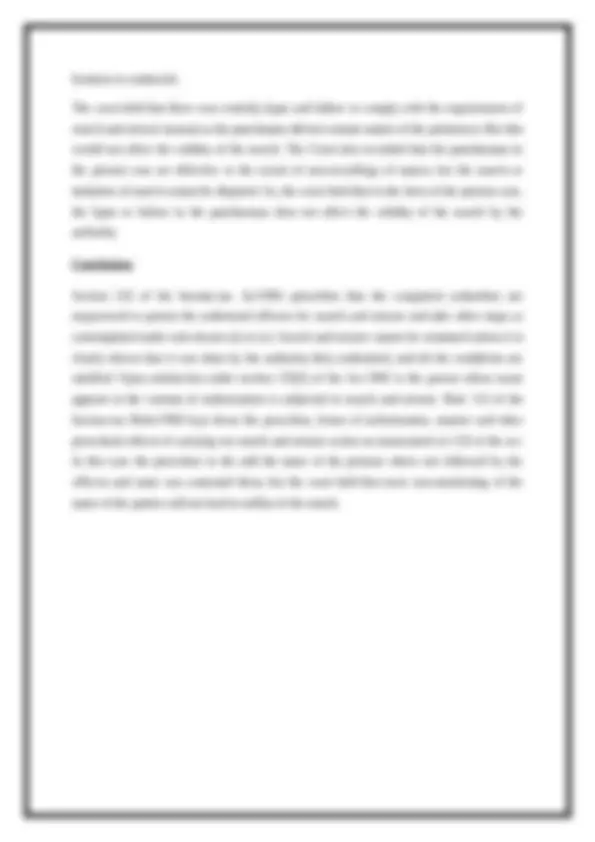



Study with the several resources on Docsity

Earn points by helping other students or get them with a premium plan


Prepare for your exams
Study with the several resources on Docsity

Earn points to download
Earn points by helping other students or get them with a premium plan
Community
Ask the community for help and clear up your study doubts
Discover the best universities in your country according to Docsity users
Free resources
Download our free guides on studying techniques, anxiety management strategies, and thesis advice from Docsity tutors
This case concerns a search and seizure operation against mdlr resorts and related companies, where the petitioners argued that the lack of their names in the panchnamas rendered the proceedings invalid. The court held that while there was a lapse in complying with the requirements of the search and seizure manual, it did not affect the validity of the search. The relevant sections of the income tax act and the court's analysis of the case.
Typology: Cheat Sheet
1 / 2

This page cannot be seen from the preview
Don't miss anything!


MDLR Resorts (P.) Ltd. v. CIT [2013 SCC OnLine Del 5174] Facts: A search and seizure operation against the petitioners were initiated against a person who belonged to one MDLR Group. The petitioners accepted the search and seizure operations in the writ petitions but the contention raised was that there was no panchnamas drawn/issued against them and, thus, proceedings under section 153A were void and bad for want of jurisdiction. They also raised another contention that which was neither been raised in the writ petition nor in the amended writ petition, but in the rejoinder affidavit of the amended writ petition, was to the effect that probably and possibly no warrant for search under section 132 was issued against the petitioners and, therefore, their names did not appear in the panchnamas. Issue: Does the lapse and failure to comply with the requirements of search and seizure manual (panchnama not containing names of the petitioners) would affect the validity of the search? Law: Section 132 of Income Tax Act 1961 Analyzation: The names of parties to be subjected to search have been mentioned at two separate places on the first page of search warrants. The first point or place refers to pre-conditions mentioned in sections 132( 1 )(a) and (b) and the second point or place refers to the pre-conditions stipulated in section 132( 1 )(c). The Second page of the form requires mentioning the address where the suspected books of account, other documents, money, bullion, jewellery, valuable articles etc. were kept, by the persons who were being subjected to search. In the panchnamas relating to MDLR Estate Private Ltd., MDLR Hotels Private Ltd. and 'S' Builders Private Ltd., it was noticed that their names were not included in the names of the persons mentioned in the column relating to clauses (a) and (b) of section 132( 1 ). However, their names were mentioned in the column relating to section 132( 1 )(c). The court held that the address of a company will normally mean its registered office or head office etc. But a person can also operate from or keep documents, money at different places and not necessarily from where
business is conducted. The court held that there was certainly lapse and failure to comply with the requirements of search and seizure manual as the panchnama did not contain names of the petitioners. But this would not affect the validity of the search. The Court also recorded that the panchmanas in the present case are defective to the extent of non-recordings of names, but the search or initiation of search cannot be disputed. So, the court held that in the facts of the present case, the lapse or failure in the panchnamas does not affect the validity of the search by the authority. Conclusion: Section 132 of the Income-tax Act'1961 prescribes that the competent authorities are empowered to permit the authorized officers for search and seizure and take other steps as contemplated under sub-clauses (i) to (v). Search and seizure cannot be sustained unless it is clearly shown that it was done by the authority duly authorized, and all the conditions are satisfied. Upon satisfaction under section 132(1) of the Act 1961 is the person whose name appears in the warrant of authorization is subjected to search and seizure. Rule 112 of the Income-tax Rules'1962 lays down the procedure, forms of authorization, manner and other procedural effects of carrying out search and seizure action as enumerated u/s 132 of the act. In this case the procedure to the add the name of the persons where nor followed by the officers and same was contented them, but the court held that mere non-mentioning of the name of the parties will not lead to nullity of the search.